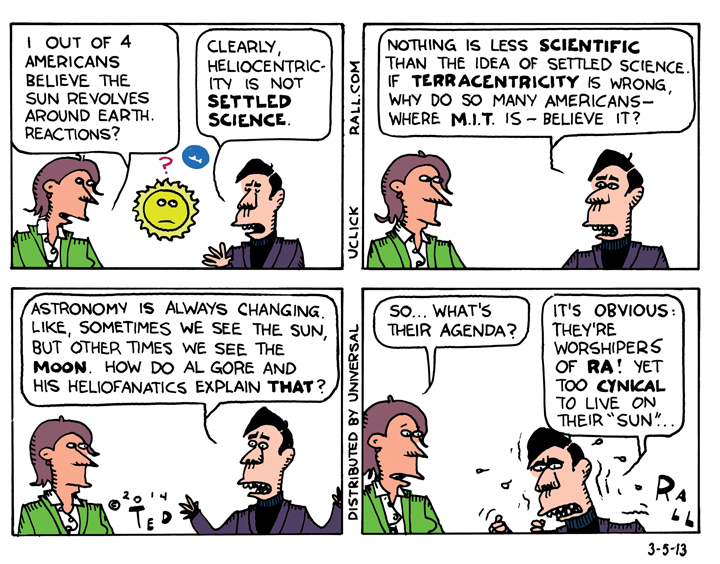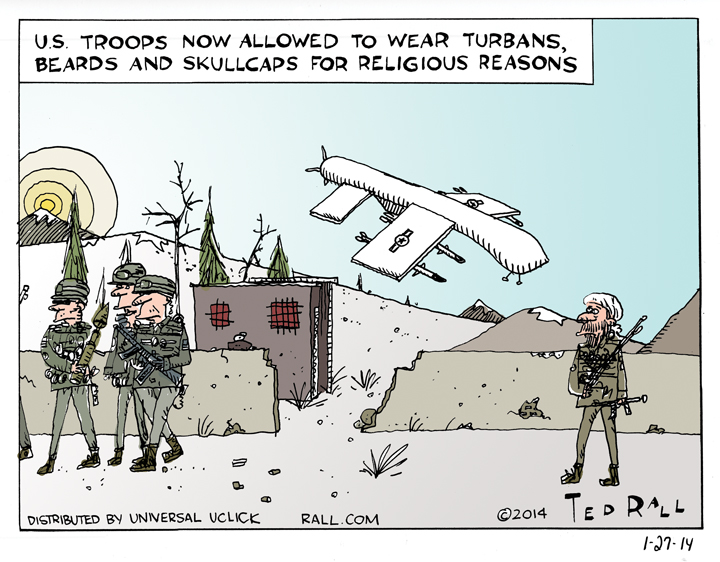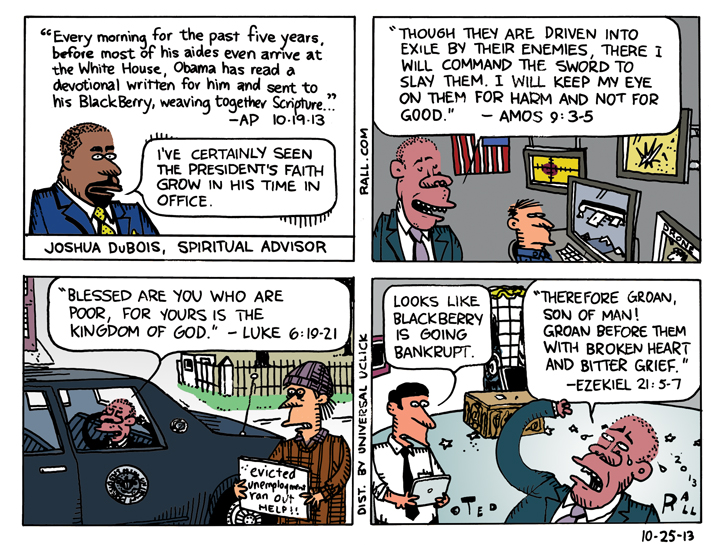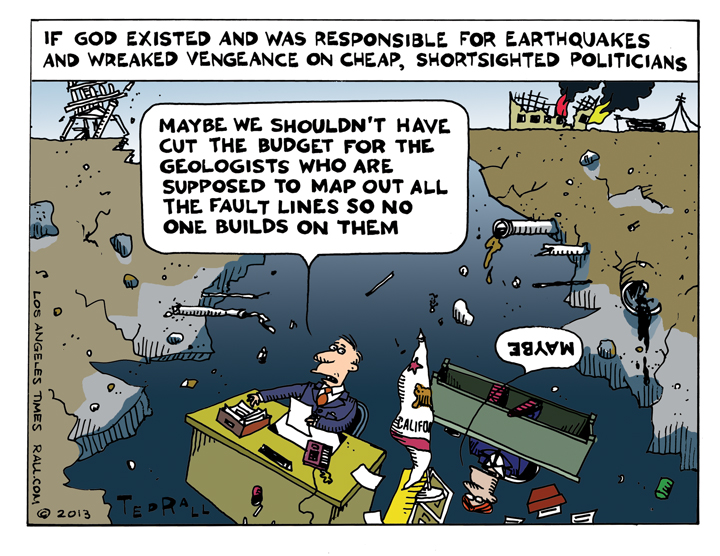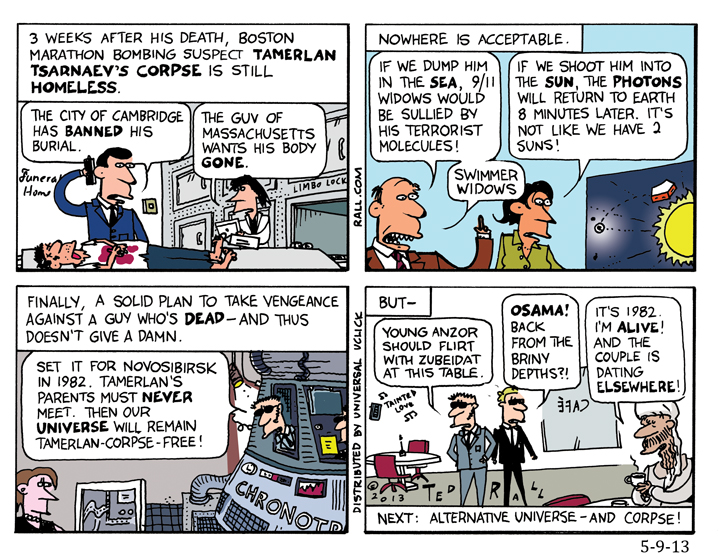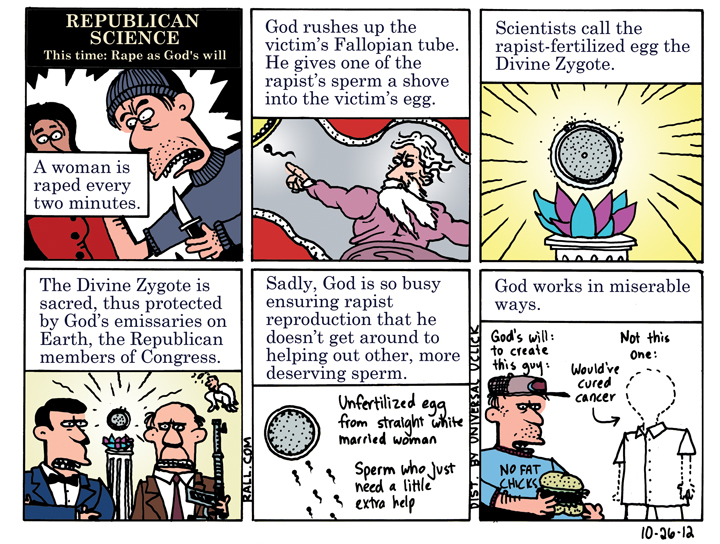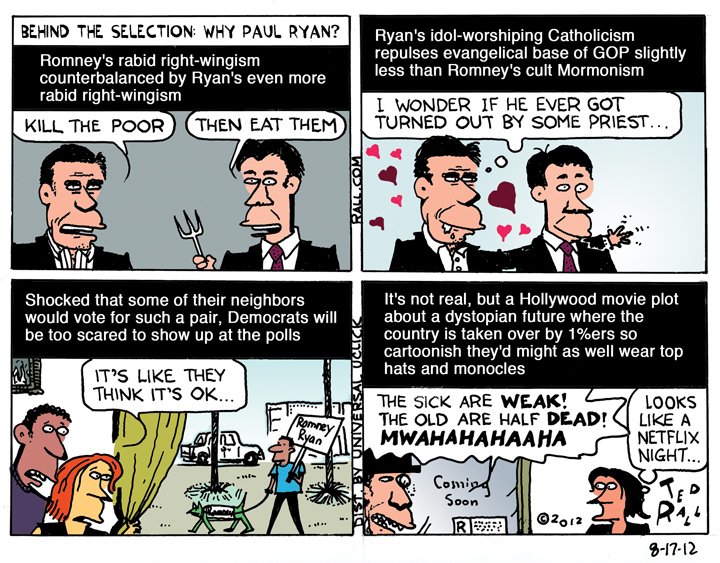Does the Earth go around the sun, or does the sun go around the Earth? When asked that question in a poll, 1 in 4 Americans surveyed answered that the sun revolves around the earth. But hey, we have to respect their feelings too.
LOS ANGELES TIMES CARTOON: Earthquake Maps
I draw cartoons for The Los Angeles Times about issues related to California and the Southland (metro Los Angeles).
This week: After the 1971 Sylmar earthquake, California began an ambitious effort to map faults across the state. Over the next two decades, officials published 534 maps of active earthquake faults. New construction was prohibited on top of these fissures because previous quakes showed that buildings could be torn apart during violent shaking. But the mapping campaign has slowed to a crawl â with many dangerous faults still undocumented. Since 1991, only 23 have been drawn. Because of budget cuts, none were completed between 2004 and 2011, according to records reviewed by The Times. State officials said there are still about 300 maps to draw and even more to revise â including some in heavily populated areas of Southern California. That represents about 2,000 miles of faults statewide.
SYNDICATED COLUMN: Why Isn’t Organ Donation Mandatory?
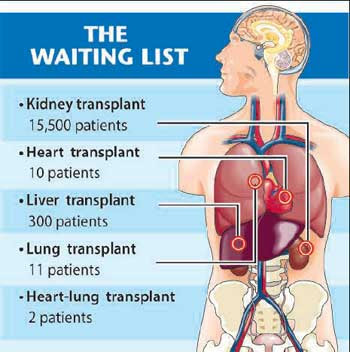
America’s Weird, Enduring Respect for Corpses
This week America’s news media obsessed over the shooting deaths of 12 people in Washington. The usual arguments over gun control seem irrelevant since there isn’t much that could have been done to prevent those particular killings. It was a navy base. Even in England, members of the military have access to automatic weapons. And even if we were inclined to start locking people up for hearing voices or feeling strange vibrations, we can’t build enough mental asylums to hold all of them.
On the other hand, it is estimated that 18 people die every day due to a national shortage of organ donations. This crisis can be solved.
Don’t worry: this is not one of Those pieces calling for you to consider signing the donor section on the back of your driver’s license.
My solution is more radical. When you die, the government should take your organs.
The transplant shortage is acute. Some patients are so desperate that they travel on ethically-dubious “medical tourism” junkets to China, which implants organs from executed prisoners. Others accept D-rate organs. Patients at the University of Maryland recently accepted kidneys that had recently been operated upon for benign or malignant tumors. Better bad kidneys than none at all.
The waiting list system is widely viewed as arbitrary and unfair. In June 2013 a federal judge made news by issuing an order suspending rules that effectively blocked children under the age of 12 from receiving organs from adult donors. Several children who might have died without the procedure benefited. Unfortunately, the court’s ruling probably killed a similar number of adult patients. Like cash, life is a zero-sum game.
It is widely believed that celebrities and wealthy people, most notably Billy Martin in 1995 and Steve Jobs in 2009, are able to cut the line, moving themselves up the waiting list. Technically, this isn’t true. But practically, it is.
A major factor determining whether or not you will receive a new organ is whether you can afford the $500,000-plus cost of the procedure and its maintenance, or whether your insurance coverage is sufficiently expensive to cover it. Rich people can pay, poor people can’t. “There’s a huge triage involved in getting in,” Arthur Caplan, chair of the department of medical ethics at the University of Pennsylvania, told CNN. “If you’re a homeless alcoholic sleeping on the streets of L.A., and you’re going toe-to-toe with Steve Jobs, you’re going to lose.”
Where resources are scarce, politics get ugly. In 2012 the University of California at San Francisco kidney exchange was accused of denying a kidney to a man because of his status as an undocumented immigrant. A petition campaign changed UC officials’ minds.
This being America and anything more progressive than the collected works of Ronald Reagan being off the table, the mainstream media turns to free-market solutions: paying prospective donors, either while they are alive or after they die, for their kidneys, livers and other body parts that could be used to enhance or save someone’s life. In 2010 The Wall Street Journal published an essay urging that we adopt Iran’s approach, which guarantees a year of health care and a cash payment to donors. A June 2013 Slate piece by Sally Satel, “How to Fix the Organ Transplant Shortage,” called for “providing in-kind rewards — such as a down payment on a house, a contribution to a retirement fund, or lifetime health insurance” to donors.
These merchantilist suggestions have gotten traction. A 2012 poll found that 55% of Americans now believe that selling your organs ought to be legal.
And maybe they’re right. But it’s easy to imagine how the commodification of body parts could corrupt an already flawed system. Do we want to live in a nation where the unemployed resort to auctioning off pieces of themselves to stave off foreclosure?
There’s not much we can do to reduce demand for organs. So let’s focus on the supply side of the equation.
Efforts to guilt Americans into donating voluntarily are failing those 18 Americans a day. But not every healthy person who refuses to sign a donor card is heartless. I know because I’m one of them. I refuse to endorse a system that rewards the rich at the expense of the poor. If the system were more transparent, and treated everyone equally, there’d be more donors.
However, the system being what it is, that’s not going to happen.
Which brings us to the government’s role. I don’t understand why organ donation isn’t mandatory. Why isn’t every corpse harvested for all of its usable organs?
It isn’t a property-rights issue. You don’t own your corpse. Neither does your family. If it did, they could leave your body to rot in the backyard. Laws dictate how to properly dispose of a dead person.
There have been baby steps toward mandatory donation. In 2010 a New York assemblyman introduced a “presumed consent” bill that would have automatically enrolled all New Yorkers as organ donors unless they opted out (analogous to the federal “do not call” list for people who don’t want to get telephone solicitations). Two dozen other nations have similar laws. The bill failed.
If the government can save 18 people a day by harvesting every available organ, why doesn’t it pass a law making it so?
The blogger Stewart Lindsey expresses the most passionate, coherent and logical argument I can find against mandatory organ donation: “If I OPT to donate my liver, kidneys, heart or any other worthwhile organ at the time of my death, I will make that decision known. Don’t we have enough intrusion from the government into our personal lives already? If they can dictate whether or not you should be an organ donor, how much longer before they will be making the choices of where you can live, where you can work, go to church or school, who you can marry, what stores you can shop in and ultimately, how long should you be allowed to live, before your organs are no longer a viable option for harvesting!”
As a student of history, I am sympathetic to slippery slope arguments. And as I wrote above, I despise the way that the current health care system prioritizes wealthy Americans over the less fortunate. But when you boil it down, Lindsey’s argument is purely emotional. It’s my liver, and you can pry it out of my cold, dead carcass…or not.
Anyway, our top government officials don’t care about those concerns.
In the end, it comes down to the power of superstition.
When we die, we cease to exist in every way. Our bodies decompose. Only idiots believe in God, the Devil, Heaven, Hell, an afterlife. Whether your body is harvested for organs, eaten by cannibals, or minced to fertilize topsoil, you will never know the difference. Anyway, no major American religion teaches that what happens to your corpse affects your destiny in the hereafter.
Between our smart phones and amazing technology that allows our government to spy on our every digital moment, citizens of the United States of America feel that they live in an incredibly modern society. But not in our hearts, not in our souls, and certainly not in our brains.
About 2.5 million Americans die every year. Most are burned or planted in the ground, completely wasted. Vast numbers of them rot away, their bodies containing potentially life-saving organs, left intact — or embalmed — for only one reason: politicians are too cowardly to challenge the ancient idea that there is something sacred in a hunk of flesh.
(Ted Rall’s website is tedrall.com. Go there to join the Ted Rall Subscription Service and receive all of Ted’s cartoons and columns by email.)
COPYRIGHT 2013 TED RALL
SYNDICATED COLUMN: The Self-Censoring of America
How Sellouts Are Killing Growth
Are you a sellout?
If you came of age during the 1960s, whether or not to sell out was the existential question of your generation. Which to choose? Reckless youthful abandon or corporate “adult” obeisance? Films that dealt with that quandary, from “The Graduate” to Bertolucci’s “The Conformist” launched a million rap sessions, yet Baby Boomers are sure to leave this ethical dilemma unresolved.
My fellow travelers, we of unlucky, witty Generation X, have lived constrained careers with fewer options. Coupled with shrinking financial aid for college, the dismal job market made the choice between Wall Street and the Peace Corps depressingly simple. So we Gen Xers projected the debate onto practitioners of pop culture. Vanilla Ice, Milli Vanilli and The Knack, judged all commerce no art, were shunned. Artists who cashed in could be deemed genuine, but only if they took chances and/or made decisions that were bad for business: The Clash, Elvis Costello, RUN-DMC, Nirvana.
The booms have gotten shorter, the busts longer, the class divide deeper. The long-predicted winner-take-all society has arrived. A higher share of the income generated by each economic sector goes to a select few; others fight over scraps.
The cost of integrity and the payoff for selling out have risen. So fewer Americans are taking chances.
People are holding on to jobs they hate, making it harder for young people to find work. Businesses are hanging tight, picking safe bets (stuff that worked before) and slashing budgets for research and innovation. Banks and other would-be investors are hoarding cash. As a result, fewer entrepreneurs are starting new businesses.
Everyone makes concessions to the marketplace. I pride myself on ideological consistency and calling things as I see them even if offends my fans. But I rarely put vulgar words into my cartoons because newspaper and magazine editors won’t run them. (If I lived in, say, England, I wouldn’t have this problem.)
Charles Schulz was one of the richest men in America, his work licensed on billions of dollars of merchandise, yet comics fans lionize “Peanuts” because the strip itself is edgy and relatively uncompromising—more art than commerce.
“Right now, the pressures of the music industry encourage me to change the walk of my songs,” the Somali-Canadian musician K’naan wrote recently. “My lyrics should change, my label’s executives said; radio programmers avoid subjects too far from fun and self-absorption.”
It’s easy to tell K’naan to keep it real. But it’s not realistic.
Keeping it real doesn’t pay the rent.
Selling out does.
“Good work always finds success,” an old boss assured me. What a lie! The cutout bins of bookstores and CD stores (if you can find one) provide all the proof you need. People buy what advertising and publicists tell them to buy. If a cool author falls in the woods, she might make a sound—but no one will ever find her book at the front of the store, much less getting interviewed by Jon Stewart.
When artists rely on capitalist markets—hopelessly corrupt, governed by gatekeepers who distribute and promote vacuous apolitical pabulum over work that challenges conventional wisdom—the freedom to choose integrity over selling out is a fraud.
“If this was censorship, I thought, it was a new kind—one I had to do to myself,” K’naan continued. “The label wasn’t telling me what to do. No, it was just giving me choices and information about my audience.”
Make a living or starve. Or give up your dreams and silence yourself. Can anyone call that a real choice?
We see the same “choice” in politics. Senator Marco Rubio recently embarrassed himself twice, first by pandering to the idiot base of the Republican Party, then walking back his stance on creationism.
“Whether the Earth was created in seven days, or seven actual eras, I’m not sure we’ll ever be able to answer that. It’s one of the great mysteries,” he told GQ.
After a month of ridicule, Rubio acknowledged the existence of science: “[The age of the Earth] is at least 4.5 billion years old.”
Rubio explained his reasoning: “I just think in America we should have the freedom to teach our children whatever it is we believe. And that means teaching them science, but also parents have the right to teach them the theology and to reconcile those two things.”
Science isn’t reconcilable with faith. Rubio knows that. But he also knows what would happen to his presidential aspirations if he admitted the truth.
God is a lie.
If you believe in God, you are stupid.
If you think the earth is 6,000 years old, that humans and dinosaurs coexisted, and/or that climate change isn’t real or caused by people, you are an idiot.
Since many of my readers believe in God, the words above will cost me sales and clients. Optimists might argue that being forthright about my beliefs will attract at least as many new customers. But that’s not the way the world works.
Integrity means doing the right thing even—especially—when it hurts you. But you have to question the philosophical underpinnings—and the future—of a society that requires its leaders and artists to work at Starbucks or to act stupider than they really are in order to get elected or sell records or books or whatever. Taking chances—which includes causing outrage—is how civilization tests new ideas, and how it progresses.
Not that they let you say whatever you want at Starbucks.
(Ted Rall’s website is tedrall.com. The author of “The Book of Obama: How We Went From Hope and Change to the Age of Revolt,” he is working on a new book about the war in Afghanistan to be released in Fall 2013 by Farrar, Straus & Giroux.)
COPYRIGHT 2012 TED RALL
Rape as God’s Will
Republican Mitt Romney’s campaign says he still supports Indiana Senate candidate Richard Mourdock after Mourdock said “God intended” pregnancies that result from rape. The campaign has not asked Mourdock to pull a TV ad featuring Romney. Mourdock, who has been locked in one of the country’s most expensive and closely watched Senate races, was asked during the final minutes of a debate Tuesday night whether abortion should be allowed in cases of rape or incest. “I struggled with it myself for a long time, but I came to realize that life is that gift from God. And, I think, even when life begins in that horrible situation of rape, that it is something that God intended to happen,” Mourdock said.
This time: I explain Republican science.

